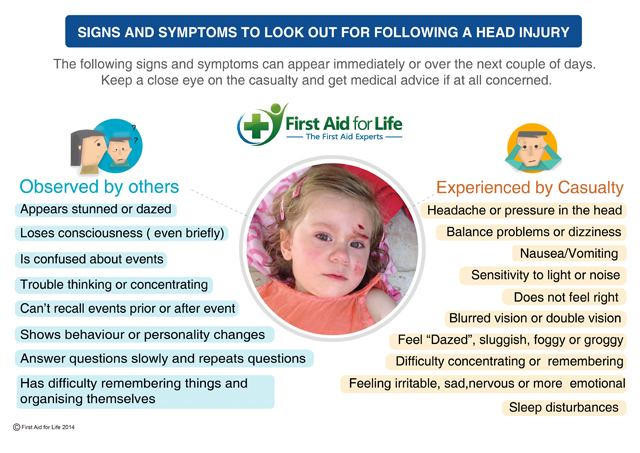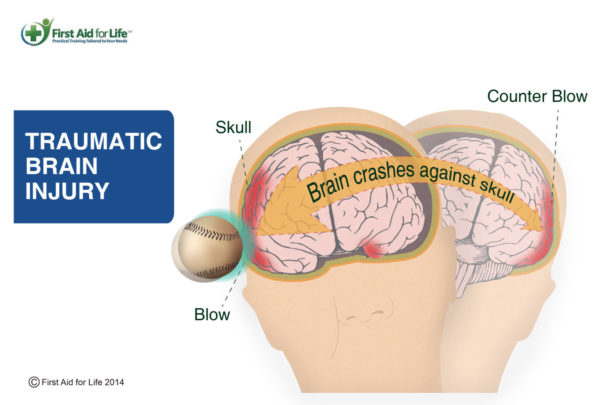Minor Head Injuries
Health
Minor Head Injuries
Head injuries can be a worry for any parent, especially as sometimes it isn't initially obvious if any serious damage has been caused. Emma Hammett of First Aid for Life gives us a few pointers on what to do if or children bang their heads.
Children frequently bang their heads and it's often difficult to tell whether or not they have done any serious damage. Most head injuries are not serious and simply result on a bump or bruise. However, severe or repeated head injuries can cause damage to the brain. Most blows to the head result in injury to the scalp only and this is more frightening than life-threatening, as the head and face are very vascular which means these injuries bleed profusely and can be very scary!
- has lost consciousness - even momentarily
- won’t stop crying
- complains of head and neck pain
- isn’t walking normally
What to do if the child has not lost consciousness and is alert and behaving normally after the fall or blow...
- Apply a wrapped ice pack or instant cold pack to the injured area for 10 minutes.
- Observe your child carefully for the next 48 hours. If you notice any of the signs of brain injury (see below), phone an ambulance immediately.
- If the incident has occurred close to bedtime or naptime and your child falls asleep soon afterward, check in every few hours to look for twitching limbs or disturbances in colour or breathing. It is okay for your child to go to sleep – there is no need to keep a child awake after a head injury - but you do need to remain vigilant. If you are concerned in any way, wake them up to check on them properly.
- If a child can’t be woken or shows any symptoms of a brain injury (see below) call an ambulance immediately.

Suspected brain injury
The brain is cushioned by cerebrospinal fluid, however a severe blow to the head may knock the brain into the side of the skull (see below) or tear blood vessels. It can be difficult to determine the level of injury, so it’s always wise to discuss a head injury with your doctor. A clear indicator of a serious injury is when a child loses consciousness or has signs of confusion. These symptoms can come on at any time from immediately after the accident to a couple of days later. It is sensible to have your child sleep in the same room as you for a couple of nights following a head injury.
Signs of brain injury - Call an ambulance if a child shows any of these symptoms:
- unconsciousness
- abnormal breathing
- obvious serious wound or suspected skull fracture
- bleeding or clear fluid from the nose, ear or mouth
- disturbance of speech or vision
- pupils of unequal size
- weakness or paralysis
- dizziness
- neck pain or stiffness
- fitting
- vomiting more than two or three times (it is not unusual for children to vomit immediately after an accident as a response to pain, so do not panic if your child is sick just once after a head injury).

If the child is unconscious
- If they are breathing, roll them into the recovery position (on their side so their tongue falls forward in their mouth and any vomit can drain away), trying not to twist their neck or spine - any head injury could have caused spinal damage.
- If they are not breathing start CPR.
- Call an ambulance.
If the child is not conscious but it is a serious injury
- Phone for an ambulance.
- Do your best to keep your child calm and still - try not to let them twist as if they have damaged their spine this could lead to a spinal cord injury.
- If there is any bleeding, use a clean cloth to apply pressure.
- Do not attempt to clean the wound as it could make things worse.
- Do not apply forceful direct pressure to the wound if you suspect the skull is fractured.
- Never remove any embedded object from wound.
If you are unsure of what to do in a medical emergency please book onto a First Aid course or you can brush up on essentials with an online course from www.onlinefirstaid.com, emma@firstaidforlife.org.uk or call 020 8675 4036 for more information.
First Aid for life provides this information for guidance and it is not in any way a substitute for medical advice. First Aid for Life is not responsible or liable for any diagnosis made, or actions taken based on this information.
Have Your Say
Be the first person to comment on this article, just post a comment below.





In order to post a comment you need to be a member. Join Now | Sign in